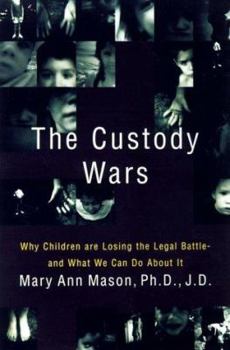The Custody Wars: Why Children Are Losing the Legal Battle--And What We Can Do about It
How should the courts decide custody cases that involve adoption, divorce, and single parenting? Should an abusive husband be given custody of his child? What about unwed fathers? Gay parents?... This description may be from another edition of this product.
Format:Hardcover
Language:English
ISBN:0465015328
ISBN13:9780465015320
Release Date:January 1999
Publisher:Basic Books
Length:288 Pages
Weight:1.05 lbs.
Dimensions:1.1" x 5.8" x 8.6"
Customer Reviews
2 ratings
What every family judge, attorney, and parent should read
Published by Thriftbooks.com User , 22 years ago
The author, who happens to be a judge, writes from the unique point of view of the child's interest -- not the mother's, father's, attorney's or GAL's (the latter two who usually run the show in family court). While it's well-known that most divorces are won by whoever has the most money and the best-connected lawyer (still, about money and paybacks to courts and judges - yes, it's a fact!) -- it's wonderful to discover that there are still a few wise people out there who care about the children involved. A *must read* for parents, judges, GALs, and child psychologists.
Mason's book demysifies The Custody Wars brilliantly.
Published by Thriftbooks.com User , 25 years ago
The thesis of Berkeley Law Professor Mary Ann Mason's highly readable and powerfully argued The Custody Wars is that the U.S. legal system fails to provide adequate representation and concern for the interests of children in custody disputes. Judiciously articulated irony abounds, as when Mason exposes the court system's vulnerability to the cynically utilized self-interest of many middle/upper class fathers and mothers for whom parenting is on the back burner. On the other hand, it is equally ironic that parents of both genders who practice self-sacrificism (not healthy, involved parenting) are sometimes the most childishly selfish in insisting upon their entitlement, regardless of the child's feelings. We learn of children whose lives are ridiculously fragmented and enervated by joint custody shuttlings, and yet we also hear of children who have benefited from the arrangement, thanks in large measure to the parents' maturity. As evidenced by the specificity and nuanced analysis in her case studies, Mason's scrupulous fairness and flexibility in offering parameters of judgment about custodial fitness are rooted in compassion for the child's well-being. She simultaneously seeks reasonably objective standards while realizing how difficult they are to determine, especially on ideological battlefields. Hers is wisdom unavailable to radical relativists or the theologically impaired. To note only two of many fine examples of her clear thinking about how the court system can be changed to make custody decisions more child-centered, Mason proposes that judges be educated in child development and that reviews of custody arrangements be mandated when the child is 7 and 12. Professor Mason has much of interest for various potential readerships. There are chapters on the unwed father, stepparents, domestic violence, gay and lesbian parents, and "test tube troubles." Mason's argument merits serious attention from a broad spectrum of policy-makers, academics, and warring couples and ex-couples. In fact, as a friend of mine, a single mother faced with absurd demands from a father with an abysmal track record, declared, "This book should be required reading for every couple considering marriage or children."





